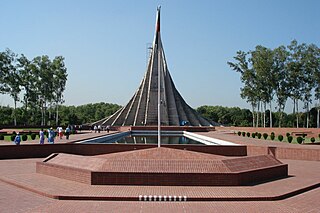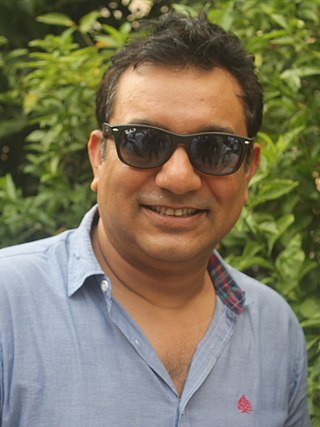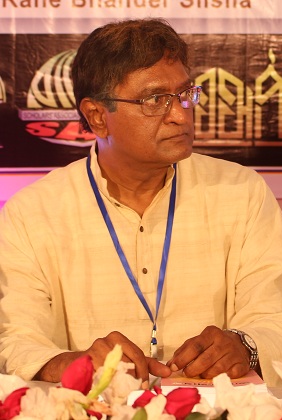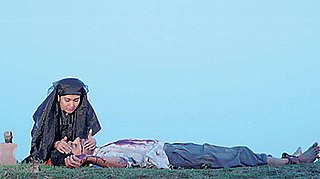Related Research Articles

Humayun Ahmed was a Bangladeshi novelist, dramatist, screenwriter, filmmaker, songwriter, scholar, and academic. His breakthrough was his debut novel Nondito Noroke published in 1972. He wrote over 200 fiction and non-fiction books. He was one of the most popular authors and filmmakers in post-independence Bangladesh. Pakistani English newspaper Dawn referred to him as the cultural legend of Bangladesh.

Lalon, also known as Lalon Shah, Lalon Fakir, Shahji and titled Fakir, Shah, was a prominent Bengali spiritual leader, philosopher, mystic poet and social reformer born in Jhenaidah, Bengal Subah. Regarded as an icon of Bengali culture, he inspired and influenced many philosophers, poets and social thinkers including Rabindranath Tagore, Kazi Nazrul Islam and Allen Ginsberg. Lalon's philosophy of humanity rejects all distinctions of caste, class, and creed and takes stand against theological conflicts and racism. It denies all worldly affairs in search of the soul and embodied the socially transformative role of sub-continental Bhakti and Sufism.

Syed Waliullah was a Bangladeshi novelist, short-story writer and playwright. He was notable for his debut novel, Lalsalu. He was awarded Bangla Academy Literary Award (1961), Adamjee Prize (1965), Ekushey Padak (1984) and Bangladesh National Film for Best Story (2001).

Tanvir Mokammel is a Bangladeshi filmmaker and writer. He is the recipient of Ekushey Padak in 2017. He won Bangladesh National Film Awards total ten times for the films Nodir Naam Modhumoti (1995), Chitra Nodir Pare (1999) and Lalsalu (2001). He is the current director of Bangladesh Film Institute in Dhaka.

The Cinema of Bangladesh is a diverse and vibrant entity, consisting of films produced across various regions, each contributing its unique linguistic and cultural perspective. Beyond the dominant Dhaka based Bengali-language film industry Dhallywood', which is a portmanteau of "Dhaka" and "Hollywood", Bangladesh is home to cinema in several other languages and dialects. For instance, Chakma cinema from Bandarban, Garo cinema from Sherpur, Meitei and Sylheti cinema from Sylhet, Chatgaiya cinema from Chattogram. These regional cinemas play a crucial role in preserving and promoting the linguistic and cultural heritage of the country. The dominant style of Bangladeshi cinema is melodramatic cinema, which developed from 1947 to 1990 and characterizes most films to this day. Cinema was introduced in Bangladesh in 1898 by the Bradford Bioscope Company, credited to have arranged the first film release in Bangladesh. Between 1913 and 1914, the first production company, Picture House, was opened. A 1928 short silent film titled Sukumari was the first Bengali-produced film in the region. The first full-length film, The Last Kiss, was released in 1931.

There have been numerous works of art created as a result of the Bangladesh Liberation War. In 1971, a concert was organized by members of the British rock band, The Beatles, in support of Bangladesh. The songs recorded for and broadcast on Swadhin Bangla Betar Kendra are still considered to be the best of Bangladeshi protest songs.

Ferdous Ahmed is a Bangladeshi film actor, producer and politician. He is the Member of Parliament of Dhaka-10.
Censorship in Bangladesh refers to the government censorship of the press and infringement of freedom of speech. Article 39 of the constitution of Bangladesh protects free speech.

Tauquir Ahmed is a Bangladeshi architect and actor, turned director in both television and cinema. His films won many international and national awards including Bangladesh National Film Awards in the Best Director, Best Screenplay and Best Story categories for the films Joyjatra (2004) and Oggatonama (2016).
Tanvir is a unisex given name and surname, derived from Arabic تنوير meaning 'enlightenment', also derived from Hindi and Punjabi languages in India meaning 'strong in body, brave from body'.

Asaduzzaman Mohammad Raisul Islam is a Bangladeshi freedom fighter and an actor in radio, theatre, television and film. He won Bangladesh National Film Award for Best Actor four times for his roles in the films Padma Nadir Majhi (1992), Anya Jibon (1995), Dukhai (1997) and Lalsalu (2001). Besides, he won Best Supporting Actor award twice for the roles in Ghani: The Cycle (2006) and Mrittika Maya (2013). As of 2016, he acted in more than 50 films. He was a member of the Crack Platoon an elite urban guerilla, intelligence and commando unit of the Mukti Bahini.
The Bangladesh National Award for Best Film is one of the categories in the National Film Awards presented annually by the Department of Films and Publications, the organisation set up by Ministry of Information in Bangladesh. It is the highest award for films in Bangladesh. This award goes to the producers of the film and is the only category in a year. The award comprises a medal, a certificate, and a cash prize of ৳50,000.
Jyotika Jyoti is a Bangladeshi actress. Her first film, Ayna, directed by Kabori Sarwar, was released in 2005. The next two important releases were Nondito Noroke by Belal Ahmed and Rabeya by Tanvir Mokammel. Later she acted in Tanvir Mokammel's film Jibondhuli and Azad Kalam's Bedeni. Jyoti also acted in a number of short film. her first short film named Break Up was in 2010. she acted in seven short film till 2019. In 2015, she appeared in Morshedul Islam's Anil Bagchir Ekdin as Atoshi, Anil's sister. Jyoti starred in Grash, production of which began in 2013. It was released in 2017.

Sheikh Niamat Ali was a Bangladeshi film director. He won the Bangladesh National Film Award for Best Director in 1979, 1985, and 1995 for all the three feature films he ever made - Surja Dighal Bari, Dahan, and Anyajiban respectively.
Lalsalu is a novel by Syed Waliullah published in 1948 by Comrade publishers. It is a classic of modern Bengali literature. Waliullah was conferred Bangla Academy Award for this debut novel in 1961. By 1981 the book's 10th edition was published.

Nodir Naam Modhumoti is a 1996 Bangladeshi Bengali language film directed by Tanvir Mokammel. It won 20th Bangladesh National Film Awards for the Best Story, Best Dialogue and Best Male Playback Singer.

Jibondhuli, also known as The Drummer, is a 2014 Bangladeshi Bengali-language drama film written and directed by Tanvir Mokammel, produced under Kino-Eye Films. The film is based on the Bangladesh Liberation War in 1971, circulating around a lower caste Hindu dhak player. The film was set to be released in December 2013, but eventually premiered in Dhaka on February 14, 2014. Jibondhuli was also premiered at the National Art Gallery of the Shilpakala Academy on October 20, 2017, along with Pich Dhala Path and Monpura.

Rabeya, also known by its English title, The Sister, is a 2008 Bangladeshi Bengali-language war film written and directed by Tanvir Mokammel, with permit from the Government of Bangladesh. The film is set during the Bangladesh Liberation War in 1971, and stars Aly Zaker, Bonna Mirza, Jyotika Jyoti, and Tauquir Ahmed in lead roles. According to Mokammel, Rabeya is a "deconstruction" of the Sophocles play, Antigone, and was premiered on December 6, 2008.

Rupsha Nodir Banke is a 2020 Bangladeshi biographical full-length film. This Bangladesh government-funded film is written and directed by Ekushey Padak-winning filmmaker Tanvir Mokammel. The main thrust of the film is the involvement of events in the historical life of a supporter of left-wing politics at different ages. In the political biography of the main character of the film called Manabratan Mukhopadhyay, various historical events that happened in Bangladesh from 1930 to 1971 are presented. Khairul Alam Sabuj, Tawsif Saadman Turjo and Zahid Hasan Sobhan have acted according to the age of Manabratan Mukhopadhyay.
References
- ↑ "Lalsalu hits cinema halls". The Daily Star. June 28, 2003. Retrieved March 14, 2016.
- ↑ Zakir Hossain Raju (2011). "Multiple Islams, multiple modernities". In Andrew N. Weintraub (ed.). Islam and Popular Culture in Indonesia and Malaysia. Routledge. p. 51. ISBN 978-1-136-81229-3.
- ↑ জাতীয় চলচ্চিত্র পুরস্কার প্রাপ্তদের নামের তালিকা (১৯৭৫-২০১২) [List of the winners of National Film Awards (1975-2012)]. Government of Bangladesh (in Bengali). Bangladesh Film Development Corporation. Retrieved March 25, 2019.
- ↑ Afsar Ahmed (June 28, 2004). "32nd BACHSAS Awards: A glitzy night". The Daily Star. Retrieved March 14, 2016.